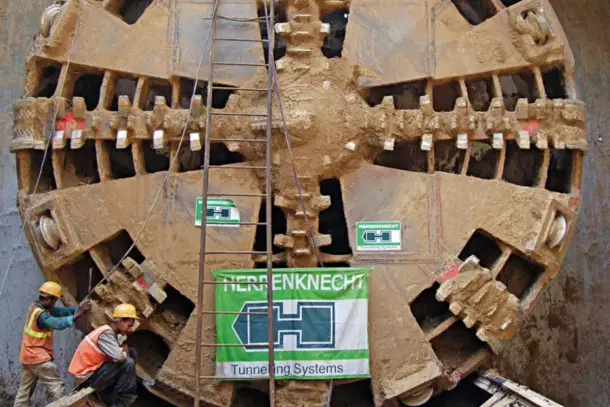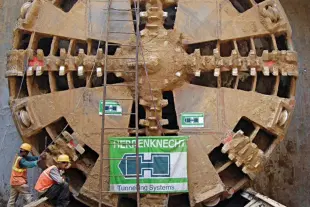Infrastructure
Tunnel Trouble: India Signals A Shift Away From German Tunnel Boring Machines Amid China’s Sales Blockade
Amit Mishra
Nov 04, 2024, 12:53 PM | Updated 01:23 PM IST
Save & read from anywhere!
Bookmark stories for easy access on any device or the Swarajya app.


In an unexpected exchange on a Delhi Metro ride, Commerce Minister Piyush Goyal informed Germany’s Vice Chancellor Robert Habeck that India might halt its purchases of German-made tunnel boring machines (TBMs) if China continues obstructing sales.
The candid conversation unfolded as Goyal and Habeck travelled to the YashoBhoomi Convention Centre in Dwarka, Delhi, for the 7th India-Germany Inter-Governmental Consultations.
Goyal explained that while India currently sources TBMs from German firm Herrenknecht, China—a key production hub for Herrenknecht—has recently started blocking these sales to India, disrupting vital infrastructure projects.
This conversation, shared in a video that has since gone viral on social media platform X, underscores China’s leverage over India’s infrastructure development ambitions.
A tunnel boring machine can excavate tunnels using a circular cross-section that drills through soil and rock strata, seamlessly laying concrete segments to construct tunnels, subway tubes, and sewer lines.
Each TBM is custom-built for specific project needs, but it can be reused once the project is completed. Refurbishing a TBM is both cost-effective and time-saving, especially when conditions allow for a quicker turnaround.
However, these massive machines come with unique challenges—they’re costly, complex to transport, and often need to be shipped in parts to be assembled on-site, making them a logistical puzzle.
Germany's Herrenknecht is the world leader in mechanised tunnelling technology. Based in Schwanau, this family-run business is the only company globally capable of delivering TBMs for all geologies and diameters, from 0.1 to 19 meters.
Since 2002, Herrenknecht has played a pivotal role in India’s infrastructure growth, providing the first TBM for Delhi Metro Phase 1. Its machines have become integral to various infrastructure projects, including water supply systems and major metro networks.
Notable projects featuring Herrenknecht TBMs include Mumbai Metro Line 3, the Kolkata Metro, and the Rishikesh-Karnaprayag rail line. Their machines will also be used in the Ahmedabad-Mumbai bullet train project.
Herrenknecht is, in fact, the only TBM manufacturer with a dedicated assembly facility in India, located in Chennai, Tamil Nadu, with most of these machines manufactured at its Guangzhou, China plant.
Sweet Spot
China’s technological advancements in tunnel boring machines over the past decade, from basics to cutting-edge, exemplify its rapid progress in high-tech manufacturing. Today, seven out of every ten TBMs used worldwide are made in China, according to the Global Times.
India's infrastructure needs have been a strong draw for China, with policy think tank Brookings India noting that demand for Chinese machinery has driven bilateral trade growth since the early 2000s.
Among the first major Chinese entrants into the infrastructure space was the Changsha-based construction giant Sany, now the world’s third-largest heavy equipment manufacturer.
However, following the clashes in Galwan Valley in June 2020, India-China bilateral relations took a nosedive, impacting infrastructure deals as well.
Recently, China, a vital production base for Herrenknecht, reportedly obstructed the sale of TBMs to India, leaving critical infrastructure projects in limbo without clear explanations for the blockade.
This Beijing-imposed export restriction on essential equipment could derail timelines for key projects, raising numerous questions, particularly in light of China’s recent announcement to resolve its four-year military standoff with India during the BRICS summit in Russia.
Scouting Beyond
Demand for tunnelling machines in India is expected to rise as new high-speed rail lines and metro projects require extensive tunnelling. Yet, the industry faces significant challenges with only a handful of domestic manufacturers.
Each tunnelling machine comes with a hefty price tag of around Rs 80 crore. When compared to China, which produces TBMs in bulk with vast manufacturing facilities and minimal taxes, Indian companies find themselves at a steep disadvantage.
Compounding the issue, underdeveloped infrastructure and logistical hurdles force manufacturers to maintain high inventories of spare parts, adding to manufacturing costs.
“It is not possible to replace the sources of these types of equipment overnight,” a former senior official from the Mumbai Metropolitan Region Development Authority (MMRDA) told the Indian Express, adding, “We will have to depend on Chinese equipment till Indian firms like BHEL (Bharat Heavy Electricals) or BEML start manufacturing these large pieces of machinery.”
Reducing dependence on China requires robust government support.
Imported TBMs were once duty-free—a major obstacle for Indian manufacturers trying to compete. To support local production, the centre introduced a seven per cent customs duty on TBMs in 2021, offering a much-needed boost to the manufacture of these giant-sized machines across India.
India can also explore alternative global suppliers, though often at a higher cost. Japanese companies like Hitachi Zosen and JIM Technology present promising options.
These firms not only aim to compete with the aggressive pricing of their Chinese rivals but also leverage Japan’s official development assistance (ODA) program to boost price competitiveness in key Asian markets like the Philippines, Indonesia, and India.




